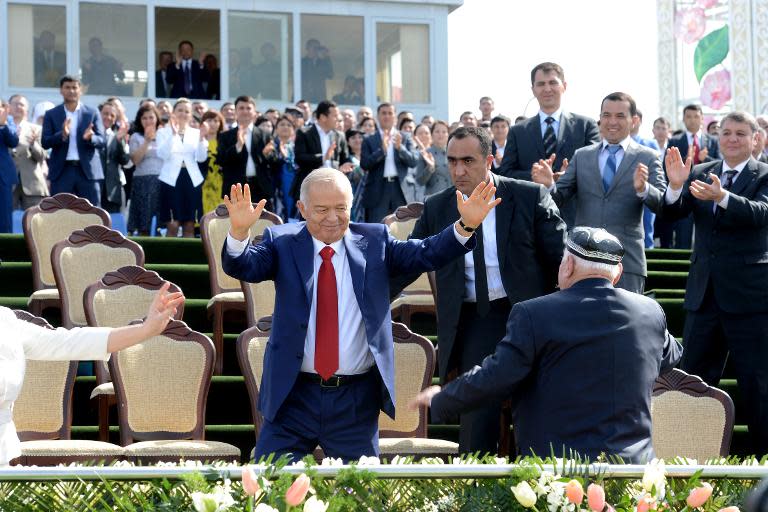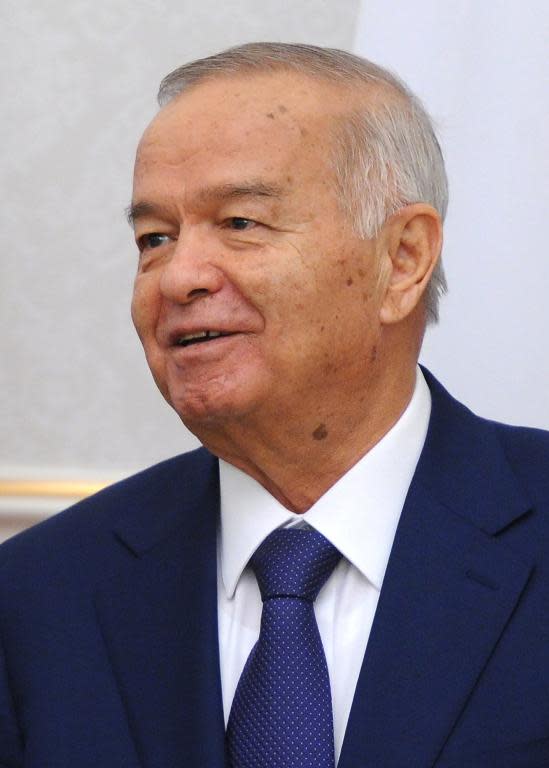Ahead of poll, aging Uzbek leader puts regime before family
Lambasted in the West over his human rights record, Uzbekistan's strongman Islam Karimov looks certain to extend his 25-year grip on power at a poll Sunday despite a bitter feud inside his own family. Having headed the Central Asian nation since before the collapse of the Soviet Union, 77-year-old Karimov argues his near-total control is vital for security and modernisation in the strategically located country. But critics say he has brutally crushed dissent to maintain his vice-like hold over a population of some 30 million while his family have turned on each other in a Shakespearean struggle for spoils that has seen his oldest daughter reportedly placed under house arrest. "Without a strong government there will be chaos in society," Karimov told a small group of voters at a Wednesday meeting in the Uzbek capital Tashkent aired by state media. "The time will come when we will give full freedom to our citizens, all human freedoms, and foremostly, freedom of the media." Officially, former Communist-era boss Karimov -- who danced off persistent rumours of ill-health at recent Nowruz new year celebrations -- is facing three opponents, but in reality he has no genuine competition in his run at a fourth term in power. All of the other candidates were put forward by parties that back his rule and the best known of them is famed for angrily rebutting accusations of shocking government rights abuses abroad. "Uzbek society lacks democratic traditions," Kamoliddin Rabbimov, a political analyst from the country currently living in exile in France told AFP. "Stability and control over society relies on the capacity of the regime to use violence." - Daughter dispute - As he moves toward another seven years in power, Karimov's main concern may be what to do with his daughter Gulnara -- a pop-singing, corruption-tainted tycoon once seen as a potential successor -- who dramatically fell from grace in an apparent palace power struggle. For more than a year now the once untouchable Gulnara Karimova, 42, has been under house arrest, her London-based spokesperson says, as the country's prosecutor probes her and business associates over connections to a "criminal gang". Formerly a fixture at Western fashion events and capable of luring the likes of Sting and Gerard Depardieu to Uzbekistan, Karimova is also under investigation in Europe over allegations she extorted some $300 million (276 million euros) from Scandinavian telecoms firm TeliaSonera for access to the Uzbek market. Her reported arrest in Uzbekistan came after a war of words played out across international media in late 2013 during which Karimova accused her mother and younger sister of sorcery, compared her father to Stalin and assailed the country’s powerful security chief for corruption and harbouring presidential ambitions on Twitter. "It appears Gulnara miscalculated in overestimating how much security she would gain from being the first daughter," says Scott Radnitz an expert on the region at the University of Washington. "It is likely (Karimov) saw her public antics and acquisitiveness as potentially destabilising, and put the interests of his regime first." While corruption allegations and family feuds might have destroyed a Western politician, there has been no hint that Karimov, seeking to further his tenure despite the two-term limit imposed by the Uzbek constitution, has been damaged by the fallout. "People say that you can tell whenever he is working at his desk in the presidential residency. Tashkent feels different. Officials are on edge," says Steve Swerdlow, a Central Asia researcher at Human Rights Watch. - Decade after killings - Since the majority Muslim republic gained independence in 1991, Karimov's regime has rebutted persistent allegations that opponents have been brutally tortured and child labour used systematically in the country's lucrative cotton sector. The most unshakeable accusations from rights activists, however, remain claims government forces killed hundreds of demonstrators a decade ago in the eastern city of Andijan on May 15, 2005. The government dismissed the reports of a massacre and said the violence was a response to the Islamic extremism it says could unravel across the region. Although there was no independent investigation of the killings, which followed the arrest and subsequent armed jailbreak of a group of religious businessmen, an OSCE report estimated the death toll at between 300-500 people, including unknown numbers of women and children. In the wake of the international criticism Tashkent shut down a US military base used to supply operations in neighbouring Afghanistan, while rights activists say that NGOs were liquidated and independent media outlets pressured into oblivion. But a decade on the Central Asian state still receives aid from the United States and in December hosted Russian leader Vladimir Putin as both Moscow and Washington tussle for influence, much to the chagrin of rights activists. "Will the international community be silent about ten years of no real progress on fundamental rights? We hope not," researcher Swerdlow said.

 Yahoo Finance
Yahoo Finance 


